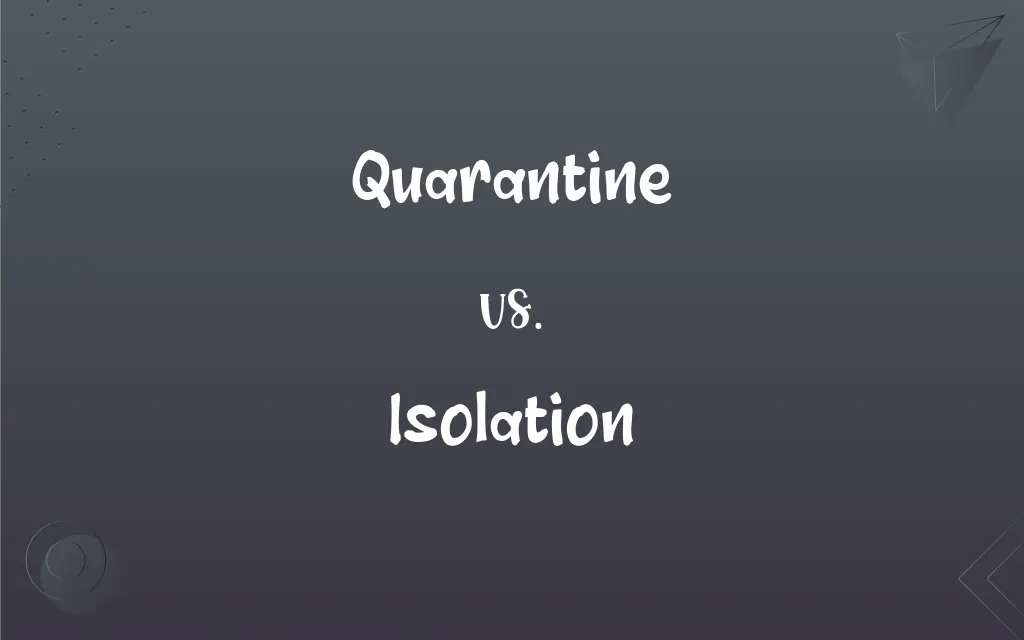Quarantine vs. Isolation: What's the Difference?
Edited by Janet White || By Harlon Moss || Updated on October 23, 2023
Quarantine restricts the movement of those exposed to a contagious disease, while isolation separates infected individuals from healthy ones.

Key Differences
Quarantine pertains to the restriction of movement or confinement of individuals who might have been exposed to a contagious disease but aren't necessarily infected. Isolation, on the other hand, involves separating those who are confirmed to be infected from those who are healthy to prevent the spread of the disease.
Quarantine serves as a precautionary measure, targeting individuals who have had potential exposure, even if they display no symptoms. Isolation, conversely, is a reactive measure applied to individuals showing symptoms or having a confirmed diagnosis.
The length of time for quarantine may vary based on the incubation period of the disease and can extend until it's clear the individual isn't infected. In contrast, isolation lasts as long as the individual remains contagious.
Both quarantine and isolation are public health practices aimed at curbing the spread of infectious diseases, but they cater to different groups: potential carriers versus confirmed cases.
Comparison Chart
Purpose
Restrict movement of potentially exposed people.
Separate infected individuals from healthy ones.
ADVERTISEMENT
Target Group
Individuals exposed but not necessarily infected.
Confirmed infected individuals.
Basis
Potential exposure to disease.
Confirmed diagnosis or symptomatic presentation.
Duration
Depends on disease incubation period.
As long as the individual remains contagious.
Intent
Precautionary.
Reactive to prevent spread from confirmed cases.
Quarantine and Isolation Definitions
Quarantine
Restriction of movement of individuals exposed to a contagious disease.
After traveling abroad, she was placed under a 14-day quarantine.
ADVERTISEMENT
Isolation
A state of being separated from others.
After the accident, he preferred a period of isolation to heal mentally.
Quarantine
An enforced isolation or restriction.
The entire town was put under quarantine during the outbreak.
Isolation
A protective measure to prevent the spread of infectious diseases.
The hospital has strict isolation protocols for certain conditions.
Quarantine
A period of time during which a person or animal is kept apart to monitor for signs of disease.
The quarantine for this particular virus lasts 21 days.
Isolation
The separation of infected individuals from those who are healthy.
The patient with the contagious illness was put in isolation.
Quarantine
A place where people or animals are kept to prevent disease spread.
The ship was docked at the quarantine station for inspection.
Isolation
Separation due to differences or uniqueness.
His unconventional views often led to his isolation in group discussions.
Quarantine
A state or condition of imposed separation.
All imported goods were held in quarantine until deemed safe.
Isolation
A condition of being isolated, separated, or alone.
The remote cabin offered complete isolation from the outside world.
Quarantine
A condition, period of time, or place in which a person, animal, plant, vehicle, or amount of material suspected of carrying an infectious agent is kept in confinement or isolated in an effort to prevent disease from spreading.
Isolation
The act of isolating
Ordered the isolation of the sick patients.
FAQs
Can someone be quarantined even if they show no symptoms?
Yes, quarantine targets individuals potentially exposed, regardless of symptom presence.
Is isolation only for those who are symptomatic?
Isolation is primarily for symptomatic individuals or those with a confirmed diagnosis.
How long does a typical quarantine last?
Quarantine duration varies based on the disease's incubation period and may differ between health guidelines.
Can animals be put in quarantine?
Yes, animals can be quarantined, especially if they're potential carriers of zoonotic diseases.
Does isolation always take place in a hospital?
No, isolation can occur at home or other settings, depending on the disease severity and healthcare guidelines.
Does isolation mean cutting off all human contact?
Not necessarily. While physical contact is limited, communication can be maintained through phones or video calls.
How do healthcare facilities ensure isolation?
They utilize designated isolation rooms, protective equipment, and strict protocols to prevent cross-contamination.
What's the primary purpose of quarantine?
Quarantine aims to restrict the movement of those exposed to a contagious disease to prevent potential spread.
Why is isolation important during an outbreak?
Isolation separates infected individuals from healthy ones, preventing the spread of the disease.
What's the difference between self-quarantine and enforced quarantine?
Self-quarantine is voluntarily undertaken, while enforced quarantine is mandated by health authorities.
What mental effects can isolation have on an individual?
Prolonged isolation can lead to feelings of loneliness, depression, anxiety, and stress.
Can quarantine be self-imposed?
Yes, individuals can self-quarantine as a precaution, especially if they believe they've been exposed.
Is a quarantine always a reaction to an existing disease?
Mostly, but it can also be a proactive measure if there's a high risk of disease introduction or spread.
Does quarantine always happen in healthcare settings?
No, individuals can be quarantined at home, in designated facilities, or even at borders and ports.
Are there legal implications if someone breaks isolation?
Yes, breaking mandated isolation can result in legal consequences, including fines or imprisonment.
Do quarantine and isolation only relate to infectious diseases?
Primarily, yes, but "isolation" can also denote separation due to non-medical reasons.
Can quarantine help in studying a disease's transmission?
Yes, observing quarantined individuals can provide insights into transmission patterns and incubation periods.
Can technology aid in effective quarantine monitoring?
Yes, technologies like apps, wearables, and drones have been used to monitor and ensure quarantine compliance.
Can a whole community be quarantined?
Yes, in severe outbreaks, entire communities or regions may be placed under quarantine.
Is isolation a new concept?
No, isolation as a means to prevent disease spread has been practiced for centuries.
About Author
Written by
Harlon MossHarlon is a seasoned quality moderator and accomplished content writer for Difference Wiki. An alumnus of the prestigious University of California, he earned his degree in Computer Science. Leveraging his academic background, Harlon brings a meticulous and informed perspective to his work, ensuring content accuracy and excellence.
Edited by
Janet WhiteJanet White has been an esteemed writer and blogger for Difference Wiki. Holding a Master's degree in Science and Medical Journalism from the prestigious Boston University, she has consistently demonstrated her expertise and passion for her field. When she's not immersed in her work, Janet relishes her time exercising, delving into a good book, and cherishing moments with friends and family.































































